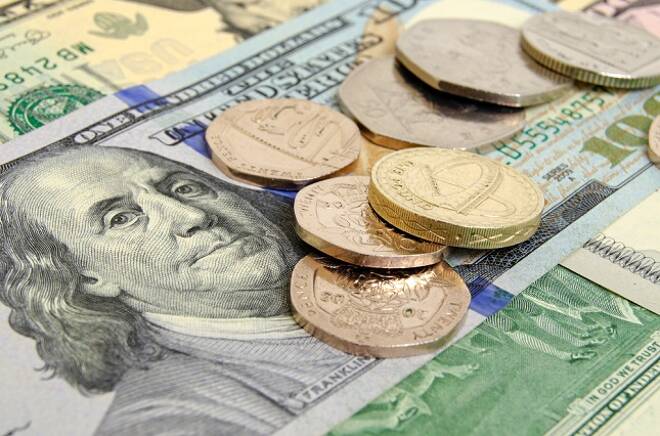Advertisement
Advertisement
Brexit and the Oval Office to Keep the GBP and USD in Focus
By:
It's "risk on" in the early hours, with news of an extension to the trade deadline being positive of the day. Trade talks and Brexit are in focus.
Earlier in the Day:
Economic data scheduled for release through the Asian session was on the lighter side this morning. Key stats were limited to 4th quarter retail sales figures out of New Zealand.
For the Kiwi Dollar,
According to figures released by NZ Stats, core retail sales surged by 2% in the 4th quarter, quarter-on-quarter. Coming in well ahead of a forecasted 0.8% rise, 3rd quarter sales were also revised upwards to a 0.7% increase.
Retail sales rose by 1.7% in the 4th quarter, coming in ahead of a forecasted 0.5% rise.
- Sales volume surged by a record 8.2% for pharmaceutical and other store-based retailing. Food and beverage services rose by 4.2% in the quarter, also a record.
- The surge in sales was attributed to a record number of visitors in December 2018. Visitors totaled 529,300, breaking the previous monthly record reached in December 2017.
The Kiwi Dollar moved rallied 0.54% to a session high $0.6883. At the time of writing, the Kiwi Dollar stood at $0.6864, a gain of 0.26% for the session.
Elsewhere,
At the time of writing, the Japanese Yen stood at ¥110.67 against the Dollar, up 0.02% for the session. The Aussie Dollar stood at $0.7144, a gain of 0.21%.
The gains for the Japanese Yen came, in spite of the risk on sentiment, with Trump’s extension to the 1st March trade deadline providing support at the start of the week. The Japanese economy has faced plenty of headwinds since the start of the trade war.
News from Trump’s twitter account of substantial progress being made also provided the support for Aussie Dollar.
The Day Ahead:
For the EUR
It’s a particularly quiet start to the week. There are no material stats scheduled for release to provide the EUR with direction.
Optimism over the prospects of a trade agreement between the U.S and China will provide some early support. While the risk on sentiment will be positive, the EU could be next on the U.S trade hit list, which would be negative for the EUR. When considering the current economic environment, the last thing the EU needs is for tariffs to hit the auto sector.
At the time of writing, the EUR down up 0.05% at $1.1341.
For the Pound
There are no material stats scheduled for release today. The Pound will be firmly in the hands of Brexit chatter throughout the day.
Over the weekend, Theresa May announced that the Parliamentary vote on the Brexit deal would not take place until 12th March. With the UK due to depart the EU on 29th March, there’s not much wriggle room for further negotiations should Parliament throw out a draft deal on 12th.
Negotiations between the EU and the British government are due to resume tomorrow. The tight schedule suggests that a delay to Britain’s departure is almost inevitable, assuming Parliament does not allow a no-deal departure.
Following the delay to a meaningful vote, there will likely be some parliamentary member reaction to the delay. More members could be heading for the Independent Group…
While the focus will be on Brexit, BoE Governor Carney is scheduled to speak later in the morning. Any forward guidance on monetary policy and the economy will be of interest ahead of Tuesday’s inflation hearings.
At the time of writing, the Pound was up by 0.12% at $1.3069.
Across the Pond
It’s a quiet day on the data front. With no material stats scheduled for release, the focus will be on trade talks, Trump’s summit with North Korean leader Kim Jong Un and tomorrow’s FED Chair testimony to lawmakers.
Progress on trade talks and the announcement of an extension to the 1st March deadline left the Dollar on the back foot early on in the session.
At the time of writing, the Dollar Spot Index was down by 0.05% to 96.462.
For the Loonie
It’s also a quiet day on the data front. With no material stats scheduled for release, the direction will continue to come from crude oil prices through the day. Disappointing December retail sales figures and the slide in WTI prices are expected to leave the Bank of Canada in a holding pattern near-term.
Risk on sentiment from positive updates on the U.S – China trade talks should limit any downside in the day.
The Loonie was down 0.05% to C$1.3141, against the U.S Dollar, at the time of writing, a pullback in crude oil prices weighing early on in the day.
About the Author
Bob Masonauthor
With over 28 years of experience in the financial industry, Bob has worked with various global rating agencies and multinational banks. Currently he is covering currencies, commodities, alternative asset classes and global equities, focusing mostly on European and Asian markets.
Advertisement
